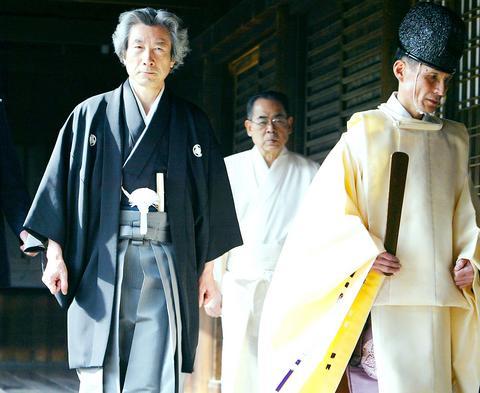Japanese Prime Minister Junichiro Koizumi made a surprise New Year visit to the controversial Yasukuni Shrine commemorating the country's war dead in Tokyo yesterday.
The move, likely to provoke an outcry from China and other nations who suffered from Japan's war-time aggression, came as Tokyo is in the process of sending military personnel to Iraq despite fierce opposition at home.
Dressed formally in "hakama" pleated skirt and traditional "kimono" bearing his family crest, Koizumi walked solemnly into the shrine, which was surrounded by hundreds of well-wishers to mark the New Year's Day.

PHOTO: REUTERS
He bowed deeply at the main chamber before being escorted inside by a Shinto priest and spent a few minutes paying his respects out of sight from the media.
"I prayed for peace and prosperity in Japan ... which has been built based on the people who lost their lives against their will during the war," Koizumi said.
Defending the visit to the war shrine, he said: "No country interferes in other countries' respect for history, tradition, custom. Since I am visiting here every year, I hope to gain understanding gradually."
Honoring 2.5 million Japanese war dead, Yasukuni is widely seen as a symbol of Japan's former militarism, particularly since 1978 when it enshrined 14 Class-A war criminals, including wartime prime minister General Hideki Tojo.
Koizumi is only the third prime minister since 1978 to visit the shrine adjacent to the Imperial Palace.
It was Koizumi's first visit to the shrine on a New Year's Day, the nation's most important national holiday, since he took office in 2001.
The nationalist premier has pledged to make a pilgrimage once a year to "dedicate on peace" but has avoided visiting there on sensitive days such as Aug. 15, the anniversary of the end of World War II.
Commenting on the reason for visiting the shrine on New Year's Day, Koizumi said he followed "Japanese tradition," adding: "I had been wondering when I should visit. I made the decision today and it was a good choice."
Koizumi made his third trip on Jan. 14 last year, drawing harsh criticism from China, South and North Korea, and other nations.
As recently as October, China reiterated that it was "difficult to understand" Koizumi's repeated remarks that he planned to continue visiting the Tokyo shrine.
"China-Japan relations are in an important period of development. We find the Japanese leader's recent comments difficult to understand," Chinese foreign ministry spokeswoman Zhang Qiyue said.
The move may further delay the restart of mutual visits by the two countries' leaders, which were suspended after Koizumi's previous visits to the shrine between 2001 and last year.
The visit may also fuel criticism against Japan's dispatch of troops to Iraq.
An advance party from Japan's military contingent left for the Middle East on Dec. 26 to set the stage for a humanitarian mission in the war-torn nation, Tokyo's most dangerous deployment of personnel since World War II.

In the sweltering streets of Jakarta, buskers carry towering, hollow puppets and pass around a bucket for donations. Now, they fear becoming outlaws. City authorities said they would crack down on use of the sacred ondel-ondel puppets, which can stand as tall as a truck, and they are drafting legislation to remove what they view as a street nuisance. Performances featuring the puppets — originally used by Jakarta’s Betawi people to ward off evil spirits — would be allowed only at set events. The ban could leave many ondel-ondel buskers in Jakarta jobless. “I am confused and anxious. I fear getting raided or even

Kemal Ozdemir looked up at the bare peaks of Mount Cilo in Turkey’s Kurdish majority southeast. “There were glaciers 10 years ago,” he recalled under a cloudless sky. A mountain guide for 15 years, Ozdemir then turned toward the torrent carrying dozens of blocks of ice below a slope covered with grass and rocks — a sign of glacier loss being exacerbated by global warming. “You can see that there are quite a few pieces of glacier in the water right now ... the reason why the waterfalls flow lushly actually shows us how fast the ice is melting,” he said.

RISING RACISM: A Japanese group called on China to assure safety in the country, while the Chinese embassy in Tokyo urged action against a ‘surge in xenophobia’ A Japanese woman living in China was attacked and injured by a man in a subway station in Suzhou, China, Japanese media said, hours after two Chinese men were seriously injured in violence in Tokyo. The attacks on Thursday raised concern about xenophobic sentiment in China and Japan that have been blamed for assaults in both countries. It was the third attack involving Japanese living in China since last year. In the two previous cases in China, Chinese authorities have insisted they were isolated incidents. Japanese broadcaster NHK did not identify the woman injured in Suzhou by name, but, citing the Japanese

RESTRUCTURE: Myanmar’s military has ended emergency rule and announced plans for elections in December, but critics said the move aims to entrench junta control Myanmar’s military government announced on Thursday that it was ending the state of emergency declared after it seized power in 2021 and would restructure administrative bodies to prepare for the new election at the end of the year. However, the polls planned for an unspecified date in December face serious obstacles, including a civil war raging over most of the country and pledges by opponents of the military rule to derail the election because they believe it can be neither free nor fair. Under the restructuring, Myanmar’s junta chief Min Aung Hlaing is giving up two posts, but would stay at the